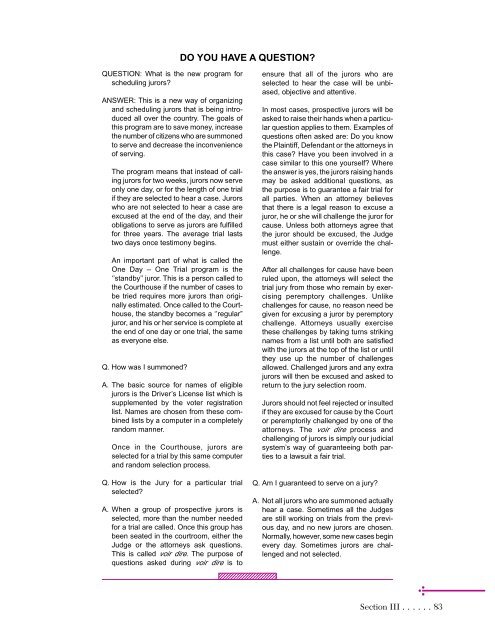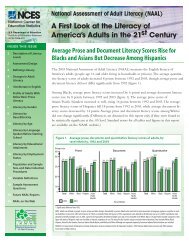Adult Literacy in America - National Center for Education Statistics ...
Adult Literacy in America - National Center for Education Statistics ...
Adult Literacy in America - National Center for Education Statistics ...
You also want an ePaper? Increase the reach of your titles
YUMPU automatically turns print PDFs into web optimized ePapers that Google loves.
QUESTION: What is the new program <strong>for</strong><br />
schedul<strong>in</strong>g jurors?<br />
ANSWER: This is a new way of organiz<strong>in</strong>g<br />
and schedul<strong>in</strong>g jurors that is be<strong>in</strong>g <strong>in</strong>troduced<br />
all over the country. The goals of<br />
this program are to save money, <strong>in</strong>crease<br />
the number of citizens who are summoned<br />
to serve and decrease the <strong>in</strong>convenience<br />
of serv<strong>in</strong>g.<br />
The program means that <strong>in</strong>stead of call<strong>in</strong>g<br />
jurors <strong>for</strong> two weeks, jurors now serve<br />
only one day, or <strong>for</strong> the length of one trial<br />
if they are selected to hear a case. Jurors<br />
who are not selected to hear a case are<br />
excused at the end of the day, and their<br />
obligations to serve as jurors are fulfilled<br />
<strong>for</strong> three years. The average trial lasts<br />
two days once testimony beg<strong>in</strong>s.<br />
An important part of what is called the<br />
One Day – One Trial program is the<br />
‘’standby’’ juror. This is a person called to<br />
the Courthouse if the number of cases to<br />
be tried requires more jurors than orig<strong>in</strong>ally<br />
estimated. Once called to the Courthouse,<br />
the standby becomes a ‘’regular”<br />
juror, and his or her service is complete at<br />
the end of one day or one trial, the same<br />
as everyone else.<br />
Q. How was I summoned?<br />
A. The basic source <strong>for</strong> names of eligible<br />
jurors is the Driver’s License list which is<br />
supplemented by the voter registration<br />
list. Names are chosen from these comb<strong>in</strong>ed<br />
lists by a computer <strong>in</strong> a completely<br />
random manner.<br />
Once <strong>in</strong> the Courthouse, jurors are<br />
selected <strong>for</strong> a trial by this same computer<br />
and random selection process.<br />
Q. How is the Jury <strong>for</strong> a particular trial<br />
selected?<br />
A. When a group of prospective jurors is<br />
selected, more than the number needed<br />
<strong>for</strong> a trial are called. Once this group has<br />
been seated <strong>in</strong> the courtroom, either the<br />
Judge or the attorneys ask questions.<br />
This is called voir dire. The purpose of<br />
questions asked dur<strong>in</strong>g voir dire is to<br />
DO YOU HAVE A QUESTION?<br />
1234567890123456789012<br />
1234567890123456789012<br />
1234567890123456789012<br />
ensure that all of the jurors who are<br />
selected to hear the case will be unbiased,<br />
objective and attentive.<br />
In most cases, prospective jurors will be<br />
asked to raise their hands when a particular<br />
question applies to them. Examples of<br />
questions often asked are: Do you know<br />
the Pla<strong>in</strong>tiff, Defendant or the attorneys <strong>in</strong><br />
this case? Have you been <strong>in</strong>volved <strong>in</strong> a<br />
case similar to this one yourself? Where<br />
the answer is yes, the jurors rais<strong>in</strong>g hands<br />
may be asked additional questions, as<br />
the purpose is to guarantee a fair trial <strong>for</strong><br />
all parties. When an attorney believes<br />
that there is a legal reason to excuse a<br />
juror, he or she will challenge the juror <strong>for</strong><br />
cause. Unless both attorneys agree that<br />
the juror should be excused, the Judge<br />
must either susta<strong>in</strong> or override the challenge.<br />
After all challenges <strong>for</strong> cause have been<br />
ruled upon, the attorneys will select the<br />
trial jury from those who rema<strong>in</strong> by exercis<strong>in</strong>g<br />
peremptory challenges. Unlike<br />
challenges <strong>for</strong> cause, no reason need be<br />
given <strong>for</strong> excus<strong>in</strong>g a juror by peremptory<br />
challenge. Attorneys usually exercise<br />
these challenges by tak<strong>in</strong>g turns strik<strong>in</strong>g<br />
names from a list until both are satisfied<br />
with the jurors at the top of the list or until<br />
they use up the number of challenges<br />
allowed. Challenged jurors and any extra<br />
jurors will then be excused and asked to<br />
return to the jury selection room.<br />
Jurors should not feel rejected or <strong>in</strong>sulted<br />
if they are excused <strong>for</strong> cause by the Court<br />
or peremptorily challenged by one of the<br />
attorneys. The voir dire process and<br />
challeng<strong>in</strong>g of jurors is simply our judicial<br />
system’s way of guarantee<strong>in</strong>g both parties<br />
to a lawsuit a fair trial.<br />
Q. Am I guaranteed to serve on a jury?<br />
A. Not all jurors who are summoned actually<br />
hear a case. Sometimes all the Judges<br />
are still work<strong>in</strong>g on trials from the previous<br />
day, and no new jurors are chosen.<br />
Normally, however, some new cases beg<strong>in</strong><br />
every day. Sometimes jurors are challenged<br />
and not selected.<br />
Section III ......83



